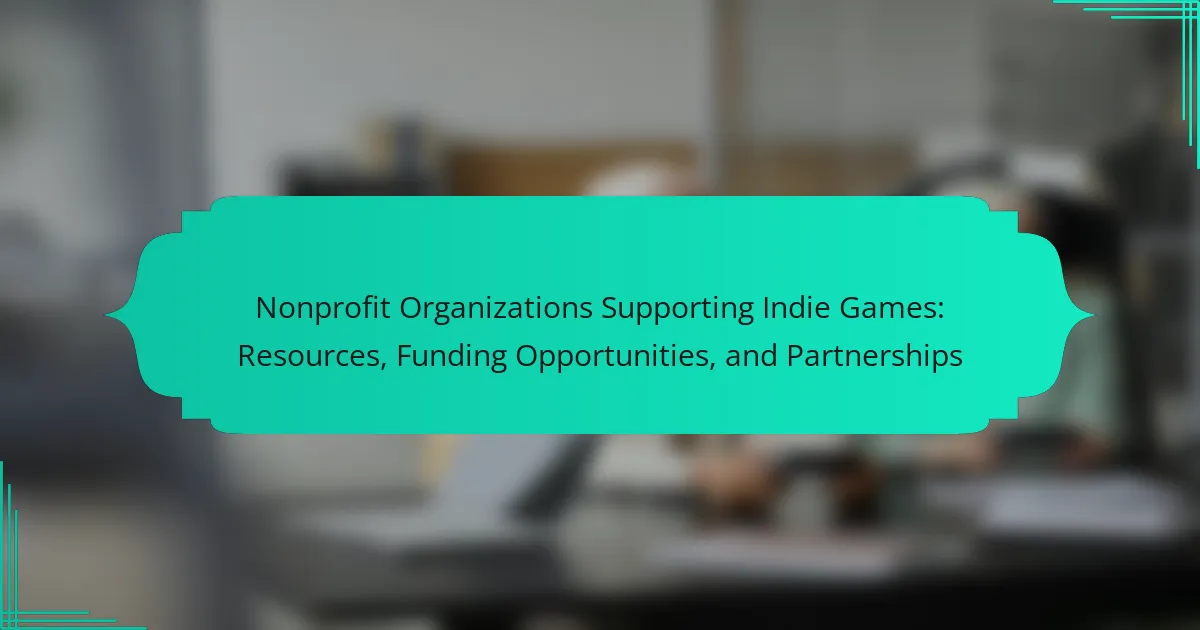Nonprofit organizations play a crucial role in supporting indie game developers by providing funding, mentorship, and resources. They offer various funding opportunities, including grants and sponsorships, while facilitating partnerships that enhance project visibility. Notable organizations like IndieCade and the IGDA Foundation foster innovation and inclusivity in the gaming community. Engaging with these nonprofits can significantly boost the success and reach of indie projects.
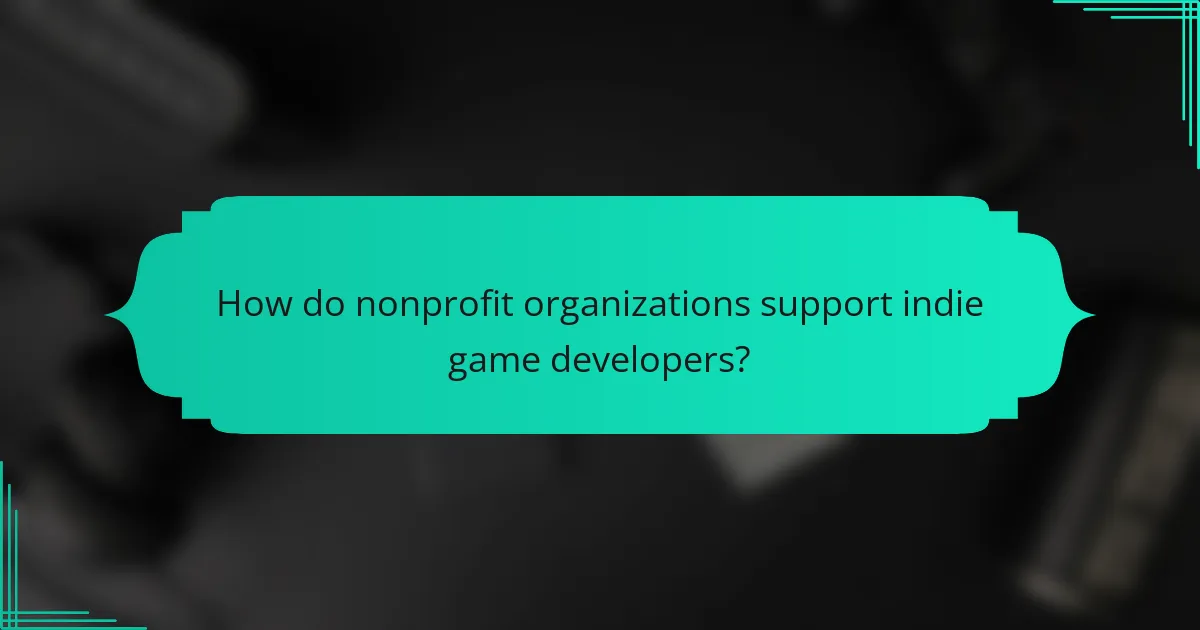
How do nonprofit organizations support indie game developers?
Nonprofit organizations support indie game developers by providing funding, mentorship, and resources. They offer grants, organize workshops, and create networking opportunities. These initiatives enhance the visibility and viability of indie games in a competitive market. For instance, organizations like IndieCade and the IGDA Foundation focus on fostering innovation and inclusivity in game development.
What are the primary goals of nonprofit organizations in the gaming industry?
The primary goals of nonprofit organizations in the gaming industry are to support indie developers, promote diversity, and provide funding opportunities. These organizations aim to foster innovation by connecting creators with resources and partnerships. They often focus on community engagement, offering mentorship and networking to enhance the indie game ecosystem. Additionally, they advocate for fair practices and inclusivity within the gaming landscape.
Which nonprofit organizations are most influential in the indie game sector?
The most influential nonprofit organizations in the indie game sector include the Indie Game Developers Network, the International Game Developers Association, and the Game Developers Conference. These organizations provide resources, funding opportunities, and foster partnerships for indie developers. They play a crucial role in promoting indie games and supporting the community.
How do these organizations foster community engagement among game developers?
Nonprofit organizations foster community engagement among game developers through networking events, mentorship programs, and collaborative projects. These initiatives create opportunities for developers to connect, share knowledge, and access resources. For example, organizations often host game jams, which encourage teamwork and innovation. Additionally, they provide funding opportunities that support diverse projects, enhancing inclusivity within the community. By facilitating partnerships, nonprofits help developers gain visibility and access to industry expertise, further strengthening community ties.
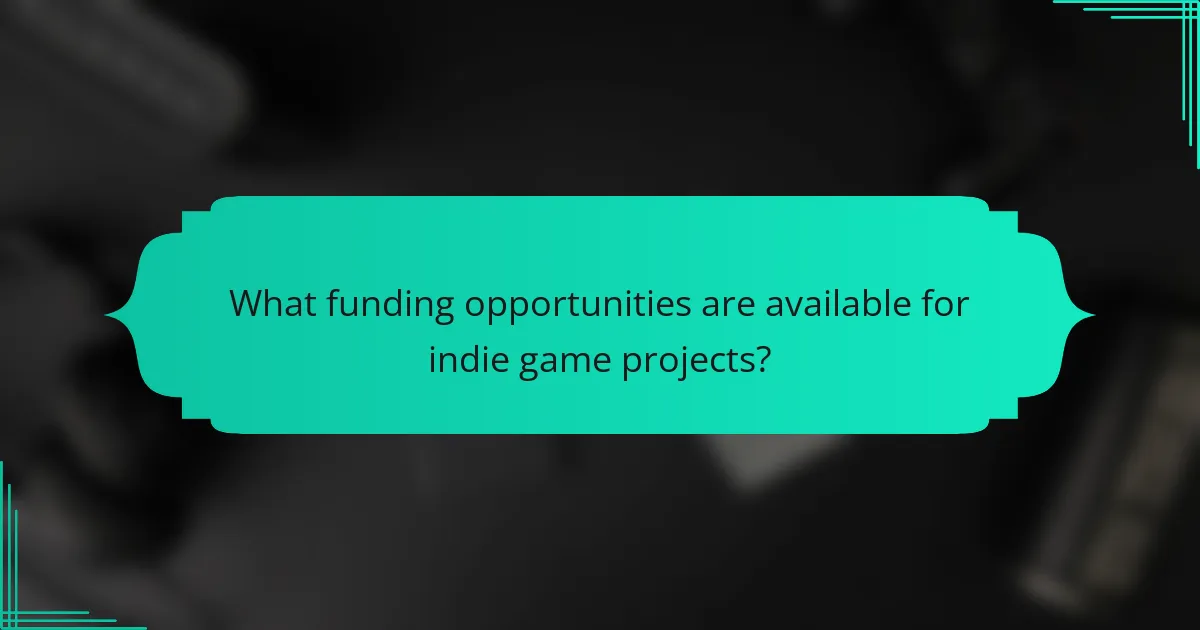
What funding opportunities are available for indie game projects?
Nonprofit organizations provide various funding opportunities for indie game projects. These include grants, mentorship programs, and partnerships that support creative development and distribution.
Some notable organizations include the Indie Game Fund, which offers financial support to promising projects, and the Game Developers Conference (GDC) Scholarship Program, which helps indie developers attend industry events. Additionally, organizations like the Entertainment Software Association Foundation provide grants for educational gaming initiatives.
Collaborating with these nonprofits can enhance project visibility and access to resources. Engaging with them can lead to networking opportunities, essential for indie developers seeking funding and support.
Which grants and scholarships are offered by nonprofit organizations for indie games?
Nonprofit organizations offer various grants and scholarships for indie games, including funding opportunities for development, marketing, and distribution. Notable examples include the Indie Game Fund, which supports innovative projects, and the Game Developers Choice Awards, providing recognition and financial support. Organizations like the IGDA Foundation also provide scholarships for underrepresented developers to attend industry events. These resources enhance the indie game ecosystem, fostering creativity and diversity.
How do crowdfunding platforms collaborate with nonprofits to support indie games?
Crowdfunding platforms collaborate with nonprofits to support indie games by providing financial resources and community engagement. These partnerships enable nonprofits to connect indie developers with funding opportunities, mentorship, and promotional support. Nonprofits often leverage their networks to amplify campaigns, reaching broader audiences and increasing funding potential. Additionally, they may offer grants or sponsorships specifically tailored for indie game projects, facilitating innovation and diversity in gaming.
What are the eligibility criteria for funding from nonprofit organizations?
Nonprofit organizations typically require applicants to demonstrate a viable project proposal, a clear budget, and alignment with their mission. Additionally, eligibility may depend on factors such as the applicant’s experience, the project’s potential impact, and community engagement. Organizations often prioritize projects that support diversity and innovation in indie games.
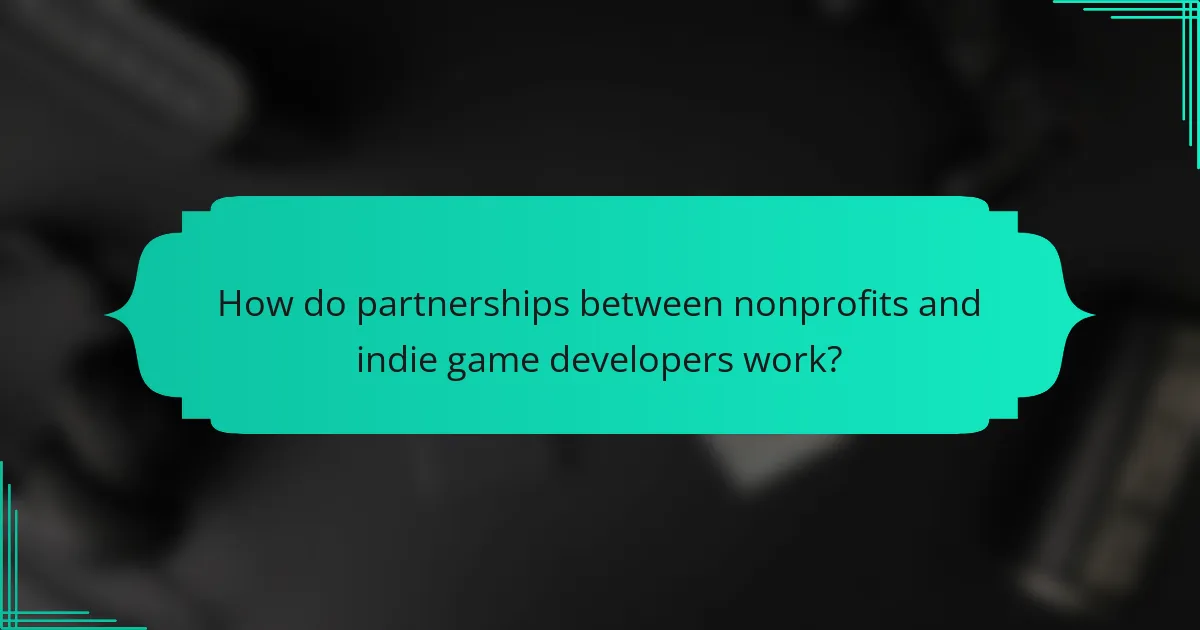
How do partnerships between nonprofits and indie game developers work?
Partnerships between nonprofits and indie game developers involve collaboration for mutual benefits. Nonprofits often provide funding, resources, and visibility for indie projects, while developers offer creative content that aligns with the nonprofit’s mission. This synergy enhances community engagement and promotes social causes. Nonprofits may assist with marketing or distribution, amplifying the game’s reach. Successful partnerships typically focus on shared values, ensuring both parties achieve their objectives.
What types of collaborations are common between nonprofits and indie studios?
Common collaborations between nonprofits and indie studios include funding partnerships, mentorship programs, awareness campaigns, resource sharing, and joint events. These collaborations enhance visibility and support for indie games while promoting social causes. Nonprofits often provide financial backing or expertise, enabling indie studios to focus on creative development.
How can indie developers effectively approach nonprofits for partnerships?
Indie developers can effectively approach nonprofits by highlighting shared goals and demonstrating the potential impact of their projects. Focus on aligning the game’s themes with the nonprofit’s mission. Build a compelling pitch that outlines mutual benefits, such as increased visibility for the nonprofit and innovative content for the developer. Networking at industry events can also facilitate introductions and foster relationships.
What are the benefits of forming partnerships with nonprofit organizations?
Forming partnerships with nonprofit organizations offers indie game developers access to funding, resources, and community support. These collaborations enhance visibility and credibility, attracting more players and investors. Nonprofits often provide grants and mentorship, which can be crucial for project success. Additionally, partnerships can foster innovation by combining diverse perspectives and expertise.
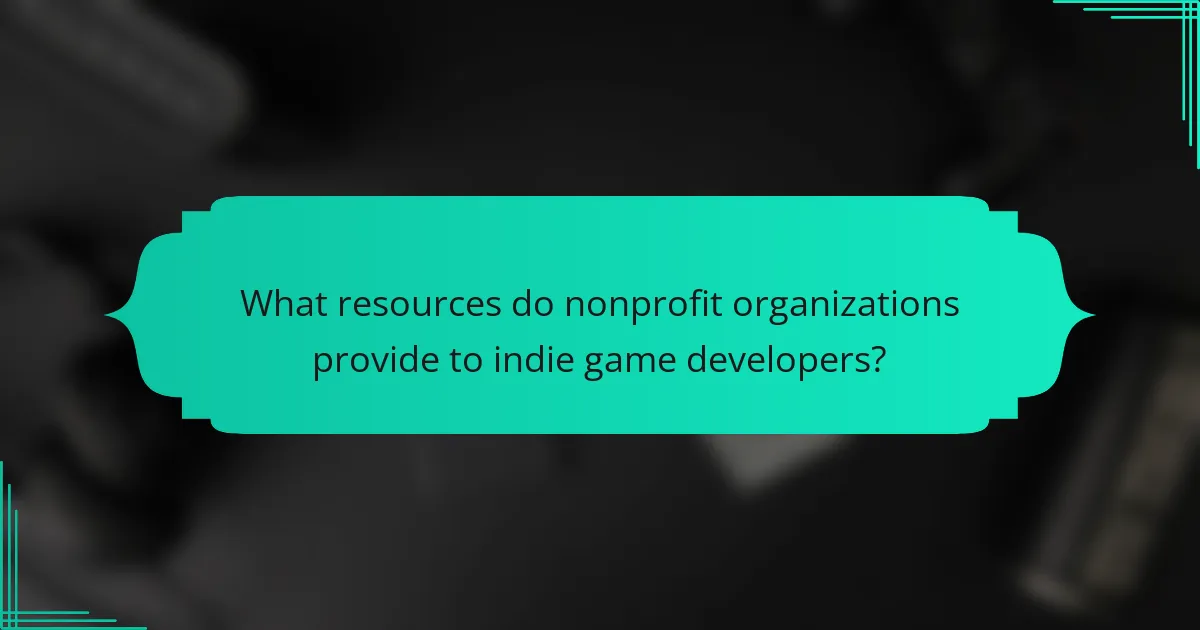
What resources do nonprofit organizations provide to indie game developers?
Nonprofit organizations provide indie game developers with funding, mentorship, networking opportunities, and resources for game development. These resources can enhance project visibility and foster collaboration within the gaming community.
Funding opportunities often include grants and sponsorships, which can alleviate financial burdens. Mentorship programs connect developers with industry experts, providing guidance on best practices and market trends. Networking events facilitate partnerships and collaborations, expanding the reach of indie projects. Additionally, resources such as workshops, online courses, and access to development tools can significantly improve skills and project quality.
Which training and mentorship programs are available through nonprofits?
Nonprofit organizations offer various training and mentorship programs for indie game developers. These programs typically focus on skill development, networking, and industry insights.
1. IGDA (International Game Developers Association) provides mentorship programs connecting emerging developers with industry veterans.
2. Games for Change offers training workshops aimed at creating social impact through games.
3. The Indie Game Accelerator by the New York Game Awards focuses on business development and marketing strategies.
4. Women in Games International supports female developers through mentorship and networking opportunities.
5. The Video Game History Foundation hosts events and workshops to educate developers about game preservation and history.
How do nonprofits facilitate networking opportunities for indie developers?
Nonprofit organizations facilitate networking opportunities for indie developers through events, mentorship programs, and collaborative projects. These initiatives connect developers with industry professionals, fostering relationships that can lead to partnerships and funding. Nonprofits often host game jams and workshops, providing platforms for developers to showcase their work and meet potential collaborators. Additionally, many nonprofits offer resources such as access to funding databases and industry insights, enhancing the networking experience for indie developers.
What tools and platforms do nonprofits offer for game development?
Nonprofit organizations offer various tools and platforms for game development, including funding, mentorship, and resources. Notable examples are GameDev.net, which provides forums and networking opportunities, and IndieCade, known for promoting indie games through events and workshops. Additionally, organizations like the IGDA Foundation support underrepresented developers with grants and educational resources. These initiatives foster collaboration and innovation within the indie game community.
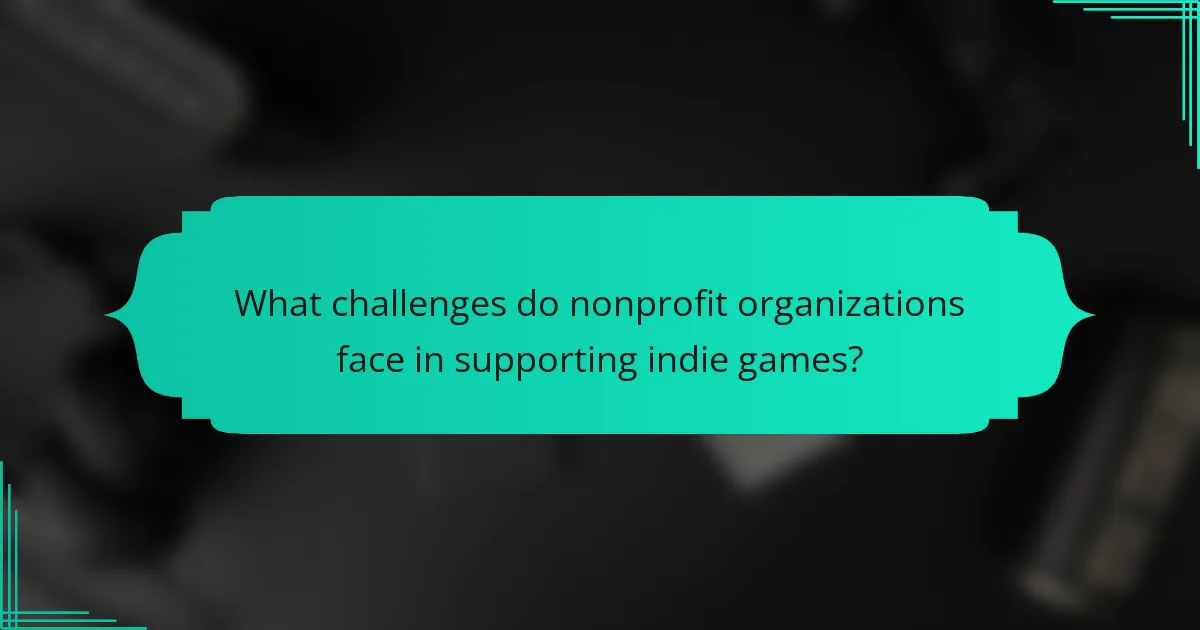
What challenges do nonprofit organizations face in supporting indie games?
Nonprofit organizations face several challenges in supporting indie games, including limited funding, resource constraints, and competition for attention. These factors hinder their ability to provide necessary support effectively. Funding opportunities may be scarce, making it difficult for nonprofits to sustain initiatives. Additionally, indie developers often struggle to gain visibility, which complicates partnerships and outreach efforts. Finally, the rapidly evolving gaming landscape requires nonprofits to adapt quickly, often outpacing their capacity to respond.
How do funding limitations impact nonprofit support for indie developers?
Funding limitations significantly hinder nonprofit support for indie developers by restricting financial resources and mentorship opportunities. Nonprofits often rely on donations and grants, which can fluctuate. This instability leads to fewer funds available for indie game projects, impacting their development timelines and quality. Additionally, limited funding affects the ability to form partnerships with other organizations, reducing collaborative opportunities that could enhance project visibility and success. As a result, many indie developers may struggle to secure the necessary support for their creative endeavors.
What are common misconceptions about nonprofit organizations in the gaming industry?
Common misconceptions about nonprofit organizations in the gaming industry include the belief that they lack funding and resources. Many assume that nonprofits only support established games, neglecting indie developers. Additionally, some think that these organizations focus solely on charity rather than fostering innovation and community. In reality, many nonprofits actively provide grants, mentorship, and networking opportunities tailored for indie game creators. They play a crucial role in promoting diversity and inclusion within the gaming landscape.
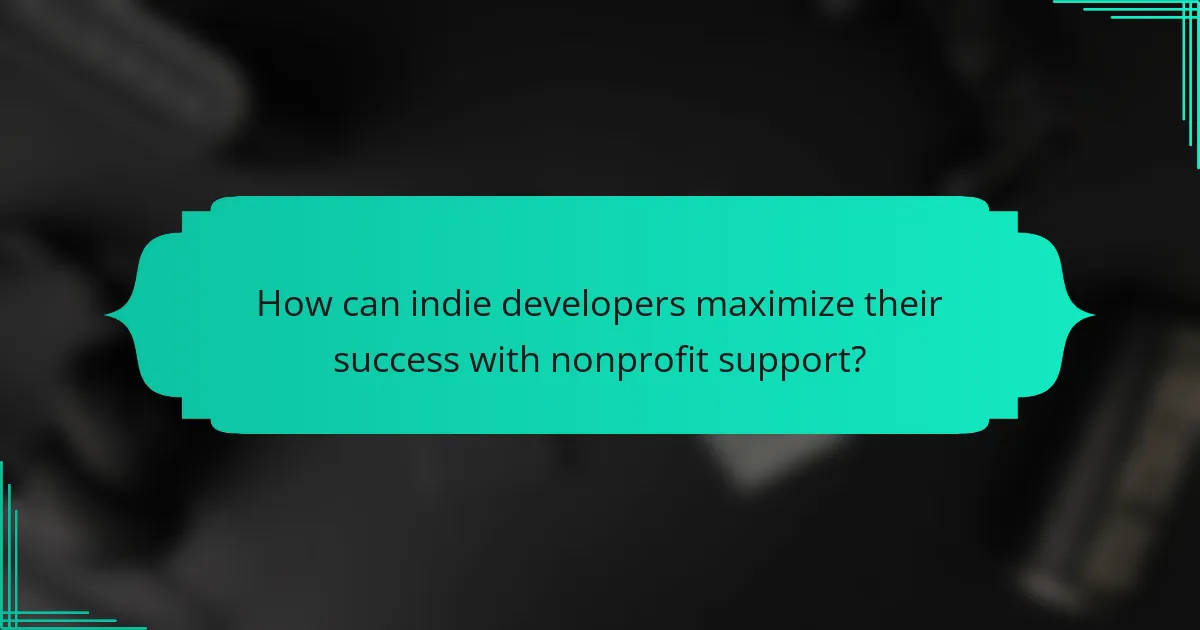
How can indie developers maximize their success with nonprofit support?
Indie developers can maximize success with nonprofit support by leveraging resources, funding opportunities, and partnerships. Nonprofit organizations often provide grants specifically for indie games, which can alleviate financial pressures. Developers should research organizations that align with their project values and goals.
Building partnerships with nonprofits can lead to mentorship opportunities, networking, and access to resources like marketing assistance. Engaging with these organizations can also enhance a game’s visibility and credibility, attracting more players and potential investors.
Additionally, participating in nonprofit-sponsored events can provide platforms for developers to showcase their work. By actively seeking these collaborations, indie developers can significantly boost their chances for success.
What best practices should indie developers follow when seeking nonprofit assistance?
Indie developers should establish clear goals, research suitable nonprofits, and prepare a compelling proposal. Building relationships with nonprofit organizations enhances collaboration and increases funding opportunities. Networking at industry events can also lead to valuable partnerships. Regular follow-ups demonstrate commitment and professionalism.
Which mistakes should indie developers avoid when working with nonprofits?
Indie developers should avoid miscommunication, underestimating project timelines, and neglecting nonprofit goals. These mistakes can hinder collaboration and funding. Clear communication fosters trust and alignment with nonprofit missions. Setting realistic timelines ensures project success and satisfaction. Understanding nonprofit objectives helps developers create games that resonate with target audiences.
How can indie developers leverage nonprofit resources for long-term growth?
Indie developers can leverage nonprofit resources through grants, mentorship, and collaboration opportunities. Nonprofit organizations often provide funding specifically aimed at supporting innovative game development projects.
Many nonprofits focus on fostering creativity and diversity within the gaming industry. They offer grants that can significantly reduce financial barriers, allowing developers to invest more in their projects. For instance, organizations like the Indie Game Fund provide financial support tailored to indie developers.
Partnerships with nonprofits can also lead to valuable mentorship opportunities. Experienced professionals in these organizations can guide developers in areas like marketing, project management, and community engagement. This mentorship can enhance the quality of the games produced and increase their market reach.
Additionally, nonprofits often host events and workshops that promote networking among developers and industry professionals. Engaging in these activities can help indie developers build connections that are crucial for long-term growth.
